(完整版)fewafew与littlealittle的用法
- 格式:doc
- 大小:14.53 KB
- 文档页数:2

a few和a little区别是什么a few和a little的区别1、读音不同a few读音:英[ə fjuː] 美 [ə fjuː]a little读音:英[əˈlɪtl] 美 [əˈlɪtl]2、意思不同a few意思:pron.一些,有些;几个.a little意思:n.一点3、用法不同a few用法:用作代词 (pron.),用于可数名词之前。
例句:She juiced a few oranges for her breakfast.她拿几个橙子榨汁当早餐饮料。
a little用法:用于不可数名词之前。
例句:The new intern is a little frisky.个新来的实习生有一点爱戏闹。
little和few的区别1、little 和few 都可用作形容词,表示“很少”、“几乎没有”,但little用于不可数名词前,few用于可数名词前。
I had little money andlittle free time.(money和time为不可数名词)我没什么钱,也很少有空闲时间。
She hadfew friends。
(friend 为可数名词,注意few后一般跟可数名词复数形式)她几乎没有朋友。
2、a little 表示“一点”,用于不可数名词前;a few 表示“几个”用于可数名词前。
A littlefood would do us all some good.吃一点儿东西会对我们大家都有些好处I gave a dinner party fora fewclose friends.我为几个密友举办了一个晚餐聚会。
3、a little of 也可表示“一点儿”,与“a little”的区别在于,a little of 侧重于表示整体中的一点,用于不可数名词前:Poura little ofthe sauce over the chicken.往鸡肉上倒一点调料。
(调料瓶中的一点儿调料)同理,a few of 则表示“总体中的几个”,用于可数名词前:There are many ways eggs can be prepared; here area few ofthem.烹调鸡蛋的方法有很多;这里是其中的几个。
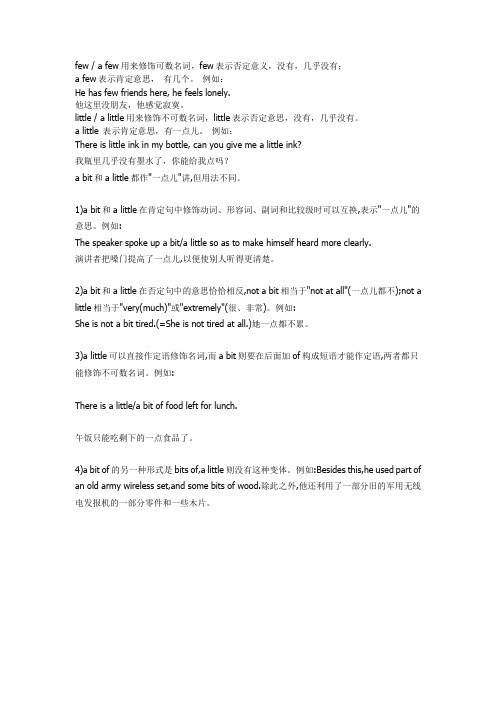
few / a few用来修饰可数名词,few表示否定意义,没有,几乎没有;a few表示肯定意思,有几个。
例如:He has few friends here, he feels lonely.他这里没朋友,他感觉寂寞。
little / a little用来修饰不可数名词,little表示否定意思,没有,几乎没有。
a little 表示肯定意思,有一点儿。
例如:There is little ink in my bottle, can you give me a little ink?我瓶里几乎没有墨水了,你能给我点吗?a bit和a little都作"一点儿"讲,但用法不同。
1)a bit和a little在肯定句中修饰动词、形容词、副词和比较级时可以互换,表示"一点儿"的意思。
例如:The speaker spoke up a bit/a little so as to make himself heard more clearly.演讲者把嗓门提高了一点儿,以便使别人听得更清楚。
2)a bit和a little在否定句中的意思恰恰相反,not a bit相当于"not at all"(一点儿都不);not a little相当于"very(much)"或"extremely"(很、非常)。
例如:She is not a bit tired.(=She is not tired at all.)她一点都不累。
3)a little可以直接作定语修饰名词,而a bit则要在后面加of构成短语才能作定语,两者都只能修饰不可数名词。
例如:There is a little/a bit of food left for lunch.午饭只能吃剩下的一点食品了。
4)a bit of的另一种形式是bits of,a little则没有这种变体。
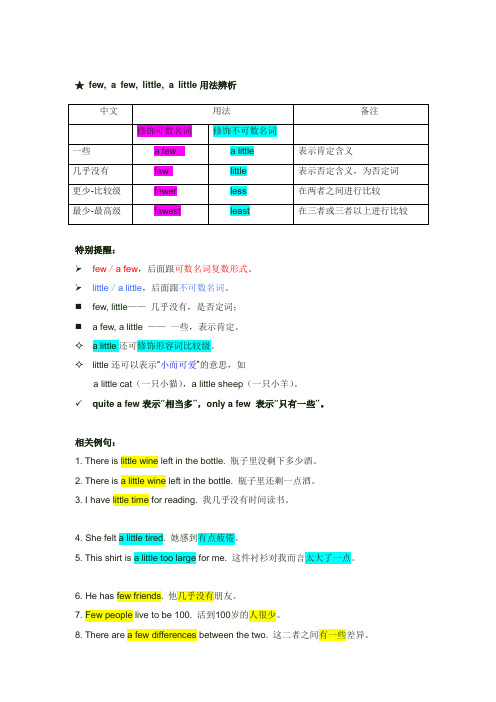
★few, a few, little, a little用法辨析中文用法备注修饰可数名词修饰不可数名词一些 a few a little 表示肯定含义几乎没有few little 表示否定含义,为否定词更少-比较级fewer less 在两者之间进行比较最少-最高级fewest least 在三者或三者以上进行比较特别提醒:few/a few,后面跟可数名词复数形式。
little/a little,后面跟不可数名词。
⏹few, little——几乎没有,是否定词;⏹ a few, a little ——一些,表示肯定。
✧ a little还可修饰形容词比较级。
✧little还可以表示“小而可爱”的意思,如a little cat(一只小猫),a little sheep(一只小羊)。
✓quite a few表示“相当多”,only a few 表示“只有一些”。
相关例句:1. There is little wine left in the bottle. 瓶子里没剩下多少酒。
2. There is a little wine left in the bottle. 瓶子里还剩一点酒。
3. I have little time for reading. 我几乎没有时间读书。
4. She felt a little tired. 她感到有点疲倦。
5. This shirt is a little too large for me. 这件衬衫对我而言太大了一点。
6. He has few friends. 他几乎没有朋友。
7. Few people live to be 100. 活到100岁的人很少。
8. There are a few differences between the two. 这二者之间有一些差异。
一.选用few, a few, little, a little, fewer, less, fewest, least填空:1. I want some water. There is _____left in my glass.2. There are a lot of new books, but _____ of them are easy to read.3. Please hurry up. There is _____ time left.4. The box is very heavy. _____ of us can lift it.5. Don't worry, we still have _____ time left.6. There are_____ books left. We can't lend you any one.7. Li Ping has learned Russian for four years, and he can speak_____ Russian now.8. There is _____ ink in my pen, so please give me_____.9. Give me another cup of tea please. There is _____ in this cup.10. Don't rush. There is still _____ time left.11. The question is so difficult that _____ students can answer it.12. There is _____ food in the cupboard. I must go and get some.13. I have quite _____ books on art.14. Can’t you walk _____ faster?15. The music from the radio sounds so beautiful. Could you please turn up the radio_____, Mum?16. —Would you please turn down the TV _____? Jack is doing his homework.—Terribly sorry. I will.17. —What about this red-T-shirt? Try it on, please.—Thank you. But it’s _____ too large.18. Why is there _____ traffic on the street today than before?19. I like the TV channel with funnier programs but _____ advertisements.20. Can you do the work well with _____ time and _____ people?二.单项选择:( ) 1. —Mr Wang, would you please tell me the result of the test?—You’ve done a good job. You made ______ mistakes.A. a fewB. fewC. a littleD. little( ) 2. She has written a lot of books, but _____ good ones.A. anyB. someC. fewD. many( ) 3. Simon makes _______ friends in his class because he is very selfish.A. fewB. a fewC. littleD. a little( ) 4. How smart Mary is! Of all the students in her class, she usually spends the________ time and make the________ mistakes in her homework.A. least; fewestB. least; leastC. fewest; leastD. most; fewest三.词汇:1. Of all the students, our monitor spent the ________(little) time but made the most progress.2. —I am worried I’m getting fatter.—You should eat ________(少) food and do more exercise.3. It takes _______(little) time to go there by underground than by bus.4. There are only 2 days left, we had better talk ______(little) and do more.答案:选用few, a few, little, a little填空:1. a little2. few3. little4. Few5. a little6. few7. a little8. little, a little9. little 10. a little 11. few 12. little 13. a few 14. a little 15. a little 16. a little 17. a little 18. less 19. fewer 20. less, fewer单项选择:1~4 B C A A词汇:1. least2. less3. less4. less。
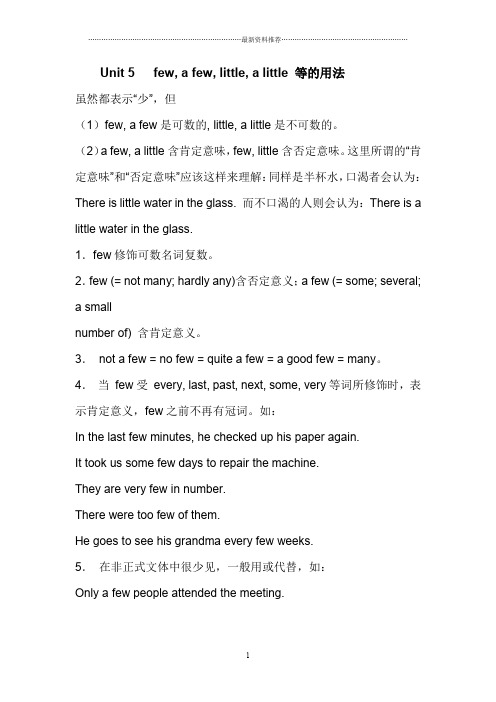
Unit 5 few, a few, little, a little 等的用法虽然都表示“少”,但(1)few, a few是可数的, little, a little是不可数的。
(2)a few, a little含肯定意味,few, little含否定意味。
这里所谓的“肯定意味”和“否定意味”应该这样来理解:同样是半杯水,口渴者会认为:There is little water in the glass. 而不口渴的人则会认为:There is a little water in the glass.1.few修饰可数名词复数。
2.few (= not many; hardly any)含否定意义;a few (= some; several;a smallnumber of) 含肯定意义。
3.not a few = no few = quite a few = a good few = many。
4.当few受every, last, past, next, some, very等词所修饰时,表示肯定意义,few之前不再有冠词。
如:In the last few minutes, he checked up his paper again.It took us some few days to repair the machine.They are very few in number.There were too few of them.He goes to see his grandma every few weeks.5.在非正式文体中很少见,一般用或代替,如:Only a few people attended the meeting.另外,little / a littleLittle remains to be done about it. (作主语)A little remains to be done.Please give me a little. (作宾语)He knows a little of everything.There is very / but little time left. (作定语)Don’t worry; you still have a little time.1.little修饰不可数名词,表示“量”。
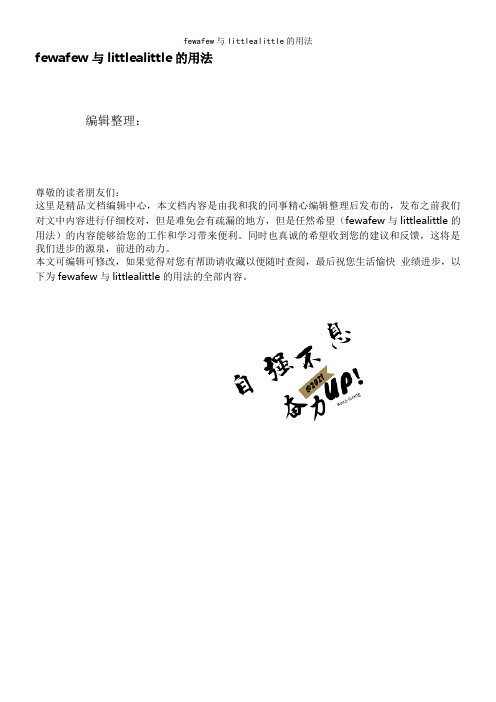
fewafew与littlealittle的用法编辑整理:尊敬的读者朋友们:这里是精品文档编辑中心,本文档内容是由我和我的同事精心编辑整理后发布的,发布之前我们对文中内容进行仔细校对,但是难免会有疏漏的地方,但是任然希望(fewafew与littlealittle的用法)的内容能够给您的工作和学习带来便利。
同时也真诚的希望收到您的建议和反馈,这将是我们进步的源泉,前进的动力。
本文可编辑可修改,如果觉得对您有帮助请收藏以便随时查阅,最后祝您生活愉快业绩进步,以下为fewafew与littlealittle的用法的全部内容。
(A)few与(A)little的使用few, a few,little, a little 虽然都表示“少”,但使用时有所区别一: few与a few1.Few a few修饰可数名词复数。
2.few (= not many;hardly any)含否定意义,极少、几乎没有。
a few (= some; a small number of)含肯定意义,有几个,有一些。
He has a few friends。
他有几个朋友。
He has few friends。
他几乎没有朋友。
3。
not a few = no few = quite a few = a good fe w = many。
4.当few受every,last,past, next, some, very等词所修饰时,表示肯定意义,few之前不再有冠词.如:In the last few minutes,he checked up his paper aga in.It took us some few days to repair the machine.They are very few in number.There were too few of them。
He goes to see his grandma every few weeks.5.在非正式文体中很少见,一般用或代替,如:Only a few people attended the meeting.二、little 与a little1。
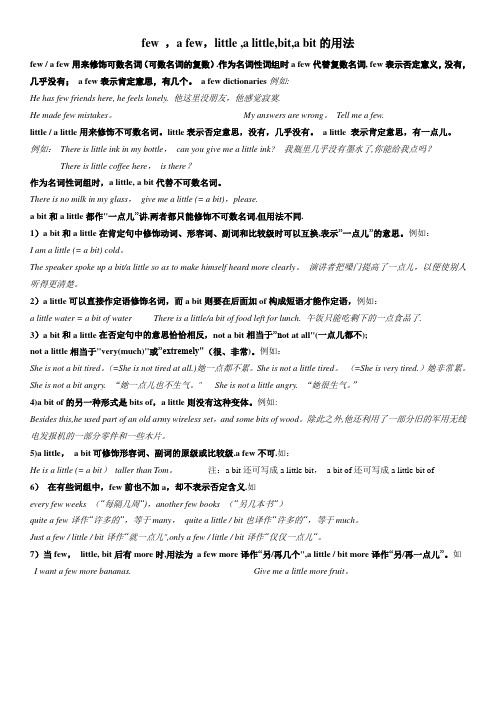
few ,a few,little ,a little,bit,a bit的用法few / a few用来修饰可数名词(可数名词的复数).作为名词性词组时a few代替复数名词, few表示否定意义,没有,几乎没有; a few表示肯定意思,有几个。
a few dictionaries例如:He has few friends here, he feels lonely. 他这里没朋友,他感觉寂寞.He made few mistakes。
My answers are wrong。
Tell me a few.little / a little用来修饰不可数名词。
little表示否定意思,没有,几乎没有。
a little 表示肯定意思,有一点儿。
例如:There is little ink in my bottle,can you give me a little ink? 我瓶里几乎没有墨水了,你能给我点吗?There is little coffee here,is there?作为名词性词组时,a little, a bit代替不可数名词。
There is no milk in my glass,give me a little (= a bit),please.a bit和a little都作"一点儿”讲,两者都只能修饰不可数名词,但用法不同.1)a bit和a little在肯定句中修饰动词、形容词、副词和比较级时可以互换,表示”一点儿”的意思。
例如:I am a little (= a bit) cold。
The speaker spoke up a bit/a little so as to make himself heard more clearly。
演讲者把嗓门提高了一点儿,以便使别人听得更清楚。
2)a little可以直接作定语修饰名词,而a bit则要在后面加of构成短语才能作定语,例如:a little water = a bit of water There is a little/a bit of food left for lunch. 午饭只能吃剩下的一点食品了.3)a bit和a little在否定句中的意思恰恰相反,not a bit相当于”n ot at all"(一点儿都不);not a little相当于"very(much)"或”extremely"(很、非常)。
few a few little a little 【2 】用法a few + 可数名词肯定句a little + 不可数名词肯定句few + 可数名词否定句little + 不可数名词否定句有a用于肯定句sometimes sometime some times some time 的差别sometimes 有时,一般用于一般如今时sometime 某个时光,一般用于一般未来.曩昔时some times 几回,一般用于如今完成时some time 一段时光,一般用于如今完成时forget 用法forget to do是指忘了要做但没有做的事; forget doing是指忘了已经做了的事.具体点说,前者强调没做,后者强调已经做过了Use用法be/get used to doing习惯于后需加名词或动名词.Used to do 表示曩昔常常做某事.Use sth to do sth 用什么目标是干什么Be used to do/for doing为了什么而用什么used to be曩昔是Surprised用法be surprised + 从句be surprised at (doing) sth.对......觉得惊异 be surprised to do sth. 吃惊做某事to one's surprise 使或人吃惊surprise sb.使或人=make sb surprisedin surprise 吃惊的..(句尾)give sb a (big) surprisednobodyneveramost— no more几乎nothing数字+nearly 不与以上连用pay attention to do留意力分散去做某事pay attention to doing留意某事get 用法1.get+adj.(系动词)2.get sb sth/get sth to sb(实意动词买)3.get sth(from sb)(实意动词得到)Get的差别get to do往往暗示一个较长的进程此时get后接的不定式平日为to know, to like, to hate, to understand, to realize等表示心理感到的动词.get doing重要用于非正式体裁中,平日表示某种特定动作的开端,尤其用于get moving, get going, get thinking等搭配.差别一:两者均可表示“开端做某事”,其细微差别如下.差别二:get to do可以表示有机遇做某事或被允许做某事,但get doing没有如许的用法. 差别三:get to do还可以表示尽力或设法做成某事,但get doing没有如许的用法.一.含有ing句型:1. carry on\keep doing 保持做某事2. practise doing sth. 演习做某事3. keep sb. Doing 使或人一向做某事4. enjoy doing 爱好做某事5. finish doing 完成做某事6. be afraid of doing 畏惧做某事7. (sth)be worth doing 值得做8. be busy doing 忙于做某事9. how about doing//what about doing 做某事怎么样10. spend some time (in)doing 花时光做某事11. spend some money (in) buying 花钱做某事12. feel like doing 想做某事13. stop/keep/prevent … from doing 阻拦或人做某事14. thank sb for doing 感激或人做某事15. thanks for doing 感激做某事16. do some cooking/cleaning/reading/shopping/washing 做点饭.打扫一下卫生.读点书.逛逛街.洗洗衣服17. go swimming/fishing/shopping/skating/boating 去泅水.垂纶.逛街.溜冰.荡舟18. mind doing 介怀做某事19. prefer doing … to doing… 比起做某事更爱好做某事20. can’t help doing 不由自主做某事21. have fun/difficulty/trouble/problem doing sth. 做某事有味.有艰苦.有艰苦.有艰苦22. waste time/money doing 糟蹋时光.钱做某事23. instead of doing 代替做某事24. miss doing 错过做某事二.含有不带to的动词不定式句型:1. had better (not) do sth. 最好(不)做某事2. would you please (not) do sth. 你可以做某事吗?3. why not do sth. 为什么不做某事?4. why don’t you do sth. 为什么你不做某事?5. Shall we do sth.? 我们要做某事吗?6. let sb do sth. 让或人做某事7. make/have sb. do sth. 使或人做某事三.含有带to的动词不定式句型:1. It’s time to do sth. 如今是做某事的时刻了2. It takes sb. some time to do sth. 做某事花了或人时光3. tell/ask/want/encourage/invite/ sb. to do sth. 告知.叫.想.勉励.邀请或人做某事4. Would you like to do sth.? 你想做某事吗/5. It’s good/bad to do sth. 做某事好.不好6. It’s good/bad for sb.to do sth. 或人做某事好.不好7. be+adj.+enough to do sth. 足够+形容词做某事8. sb. is ready to do sth. 或人预备好做某事9. It’s+adj.+ for sb. to do sth. 做某事对或人+形容词(做这件事对你好)10. It’s+adj.+ of sb. to do sth. 或人做某事+形容词(你做这件事真好)11. would like/love /decide/want/wish/to do sth. 想.爱好.决议.想.愿望做某事12. would like/love sb. to do sth. 想.爱好或人做某事13. Prefer to do sth. rather than do sth. 情愿做某事而不愿做某事I prefer to stay at home rather than go out. 我情愿呆在家里不愿出去14. how/ when/where/whether to do sth 怎么.什么时刻.在哪里.要不要做某事15. can’t wait to do 迫在眉睫做某事16. too … to do … 太怎么样而不能做某事17. be afraid /ready/able/sure to do 畏惧.预备.可以或许.肯定做某事18. seem to do 似乎做某事四.既用带to的动词不定式又用ing情势的句型:1.stop to do/ doing 停下来做另一件事停滞做某事2.forget to do/ doing 忘却做某事忘却做过某事3.remember to do/doing 记住做某事记得做过某事4.go on to do/doing 持续做另一件事持续做某事5.like to do/doing 爱好做某事(暂时.长期)6.love to do/doing 爱好做某事(暂时.长期)7.prefer to do/doing 更爱好做某事(暂时.长期)8.hate to do/doing 憎恶做某事(暂时.长期)五.下列构造用带to的动词不定式和ing情势寄义雷同:1.begin to do/doing 开端做某事2.start to do/doing 开端做某事3.continue to do/doing 持续做某事六.既用不带to的动词不定式又用如今分词的句型:用不带to的动词不定式强调动作的完成进程;用如今分词强调动作的进行状况.1.hear sb do sth./doing 听见或人做某事听见或人正在做某事2.listen sb do sth./doing 听或人做某事听或人正在做某事3.look at sb do sth./doing 看或人做某事看或人正在做某事4.see sb do sth./doing 看见或人做某事看见或人正在做某事5.watch sb do sth./doing 不雅察或人做某事不雅察或人正在做某事6.notice sb do sth./doing 留意到或人做某事留意到或人正在做某事英语中考作文全能句子:一.…the most + 形容词+ 名词+ (that) + 主词+ have ever + seen (known/heard/had/read, etc)例句:Helen is the most beautiful girl that I have ever seen. 海伦是我所看过最俏丽的女孩.Mr. Chang is the kindest teacher that I have ever had. 张先生是我曾经碰到最善良的教师.二Nothing is + ~~~ er than to + V Nothing is + more + 形容词 + than to + V例句:Nothing is more important than to receive education. 没有比接收教导更重要的事三 ~~~ cannot emphasize the importance of ~~~ too much. (再怎么强调……的重要性也不为过.)例句:We cannot emphasize the importance of protecting our eyes too much. 我们再怎么强调破坏眼睛的重要性也不为过.四There is no denying that + S + V ...(不能否定的……)例句:There is no denying that the qualities of our living have gone from bad to worse.不能否定的,我们的生涯品德已经日就衰败.五It is universally acknowledged that +句子~~ (全世界都知道……)It is common knowledge that +句子~~例句:It is universally acknowledged that trees are indispensable to us. 全世界都知道树木对我们是不可或缺的.六 There is no doubt that + 句子~~ (毫无疑问的……)例句:There is no doubt that our educational system leaves something to be desired. 毫无疑问的我们的教导轨制令人不满足.七 An advantage of ~~~ is that + 句子(……的长处是…例句:An advantage of using the solar energy is that it won’t create (produce) any pollution. 应用太阳能的长处是它不会制作任何污染.八The reason why + 句子 ~~~ is that + 句子(……的原因是……)例句:The reason why we have to grow trees is that they can provide us with fresh air. The reason why we have to grow trees is that they can supply fresh air for us. 我们必须种树的原因是它们能供给我们新颖的空气.九So +形容词 + be + 主词 + that + 句子(如斯……乃至于……)例句:So precious is time that we can’t afford to waste it. 时光是如斯名贵,我们经不起糟蹋它.十 Adj + as + Subject(主词)+ be, S + V~~~ (固然……)例:Rich as our country is, the qualities of our living are by no means satisfactory. (by no means = in no way = on no account 一点也不)固然我们的国度富有,我们的生涯品德绝对令人不满足十一 The + more + Adj + S + V, the + more + Adj + S + V ~~~(愈……愈……)例:The harder you work, the more progress you make. 你愈尽力,你愈提高. The more books we read, the more learned we become. 我们书读愈多,我们愈有学问十二By +Ving, ~~ can ~~ (借着……,可以或许……)例句:By taking exercise, we can always stay healthy. 借着做活动,我们可以或许始终保持健康.十三 ~~~ enable + sb.+ to + V (使……可以或许……例句:Listening to music enable us to feel relaxed. 听音乐使我们可以或许感到轻松。
l i t t l e,a l i t t l e,f e w,a f e w,m a n y,m u c h的用法练习little(表示否定)修饰不可数名词。
少,不多的。
Hurryup!Thereislittletimeleft.赶快!没剩下多少时间了. alittle(表示肯定)修饰不可数名词。
一些,一点点。
Don'tworry,youstillhavealittletime.别但心,你还有一点时间呢。
few(表示否定)修饰可数名词。
很少的。
Fewpeopleknowit。
几乎没什么人知道这一点。
afew(表示肯定)修饰可数名词。
有些,几个。
Afewpeopleknowit。
有几个人知道这一点。
数名词一点以下是参考别人的:?few,afew修饰可数名词,little,alittle修饰不可数名词。
few和little表示几乎没有,表否定。
alittle和afew表示有一些。
few是几乎没有,afew是有一点,都是修饰可数名词;little和alittle也是一样,但是修饰不可数名词few比afew少little比alittle少few是用在可数的little是用在不可数的1)many,much都表示“许多”,many修饰可数名词复数,much修饰不可数名词。
many,much 构成的词组有:toomany,toomuch;somuch,somany;agreatmany(修饰可数名词复数)。
【例如】Therearemanypeasantsworkinginthefield.DidyouspendmuchtimeonyourworkYouhavemad esomanymistakesthatIevendon'tknowhowtocorrectthem.Asastudent,oneshouldreadagr eatmanybookswhichareessentialtoenrichingone'sknowledge.2)few,little,afew,alittlefew,afew修饰可数名词,little,alittle修饰不可数名词。
a few of和a little的区别用法"A few" 和 "a little" 都可以表示数量的概念,但是它们在使用上有一些差异。
1. "A few" 表示 "一些",通常用于可数名词后,表示数量不多但是足够的意思。
例如:- I have a few friends.- There are a few apples on the table.2. "A little" 也表示 "一些",但是通常用于不可数名词后,表示数量不多但是足够的意思。
例如:- I have a little money.- Can I have a little milk in my coffee?3. "A few" 重点在于强调数量的有限性,而 "a little" 重点在于强调数量的不足。
- We have a few options to choose from. (强调有限的选择)- There is a little time left before the meeting. (强调有限的时间)4. "A few" 和 "a little" 在肯定句和否定句中的表达有所区别。
在肯定句中,它们表示肯定的数量:- I have a few books. (我有一些书。
)- I have a little time. (我有一点时间。
)而在否定句中,它们表示否定的数量,即几乎没有:- I don't have a few books. (我几乎没有书。
)- I don't have a little time. (我几乎没有时间。
)总结来说,"A few" 用于可数名词表示不多的数量,"a little" 用于不可数名词表示不多的数量。
初三英语中考语法考点重难点详解(27)many,much,few,little,a few,a little不定代词用法比较(含练习)这是几个表述数量的不定代词,注意区分可数与不可数,注意区分肯定和否定含义。
需要注意的是:1. only a few = few 表示否定含义,很少,例如:It was so cold that only a few\ few people went out.那天很冷,很少人出去。
2. only a little = little 以为很少,表否定。
I must go to the butcher's since there is little \ only a little meet in the fridge.我得去肉店,冰箱里的肉不多了。
3. quite a few = many 意为很多,肯定含义,例如:Quite a few \ many people go to the beach to enjoy the nice weather. 很多人去海滩享受好天气。
4. quite a little = much 很多,表肯定含义。
He did business and earned quite a little \ much money. 他做生意挣了不少钱。
至于little 和few 的区别,可以这样记:little长,对应三个字”不可数“,few 短,对应两个字”可数“。
用法辩析1. few 与little 作形容词用,都表示“几乎没有”,相当于一个否定词。
具体区别:(1) few 后面跟复数可数名词。
(2) little 后面跟不可数名词。
e.g.He has few friends. 他没有几个朋友。
They has little money. 他们没有什麽钱2. a few 与a little 都表示肯定的意思,指“有一点,有一些”。
具体区别:(1) a few 后跟可数名词复数。
(A)few与(A)little的使用
few, a few, little, a little 虽然都表示“少”,但使用时有所区别
一: few与a few
1.Few a few修饰可数名词复数。
2.few (= not many; hardly any)含否定意义,极少、几乎没有。
a few (= some; a small number of) 含肯定意义,有几个,有一些。
He has a few friends. 他有几个朋友。
He has few friends. 他几乎没有朋友。
3. not a few = no few = quite a few = a good few = many。
4.当 few受 every, last, past, next, some, very等词所修饰时,表示肯
定意义,few之前不再有冠词。如:
In the last few minutes, he checked up his paper again.
It took us some few days to repair the machine.
They are very few in number.
There were too few of them.
He goes to see his grandma every few weeks.
5.在非正式文体中很少见,一般用或代替,
如: Only a few people attended the meeting.
二、little 与a little
1. little 与a little 修饰不可数名字。
2. Little含否定意义(反义词:much);极少、几乎没有。
A little含肯定意义(反义词:none),有一点、有一些。
We still have a little time. 我们还有点时间。
There is little time left.几乎没剩下什么时间了。
3. 在非正式英语中,一般很少用little,常用not much, only a little
来代替,如: We haven’t got much money / time
4. a little 与 little 也可以用作副词, 表示“有点”“稍稍” 表示
“很少
e.g. ----Can you speak English?
----Yes, but only a little.
This book is a little more difficult than that one. ( 修饰比较级)
三、归纳
不带 a 的little和few 含有否定意义,表示数量很少或几乎没有,
强调“少”;带有a 的little和few含有肯定意义,表示数量虽然少但
毕竟还有,强调“有”。
Few people like such things. 没什么人喜欢那样的东西。
A few people like such things. 有少数人喜欢那样的东西。
He knows little English. 他乎不懂英语。
He knows a little English. 他懂一点点英语。
注意,当few前不带 a,但带有the, some these, those等修饰语时,
也表示肯定意义。如:
Some few have already left. 有几个已经离开了。
The last few winters have been very cold.过去几个冬天都很冷。
The first few chapters are about his early days.前几章谈他的少年时期。